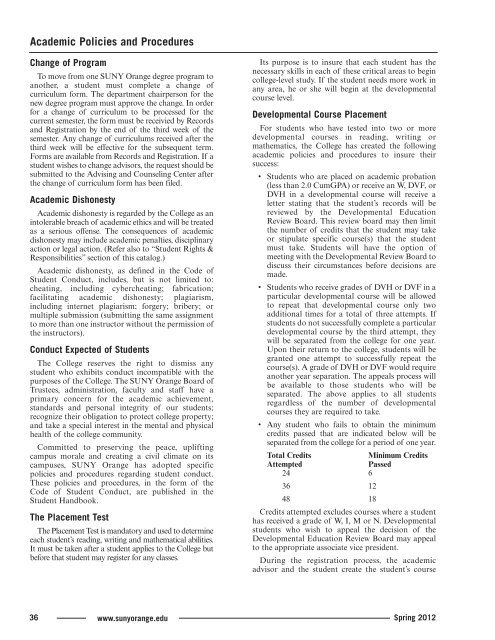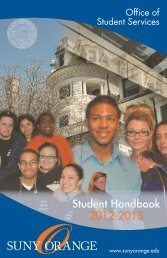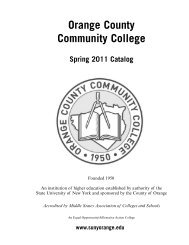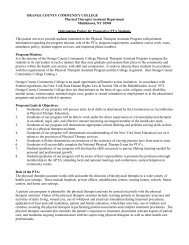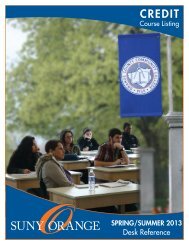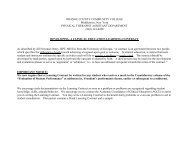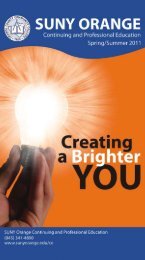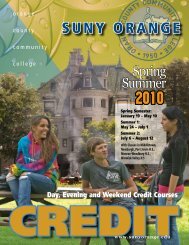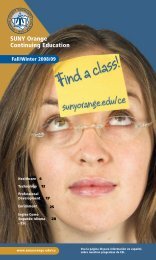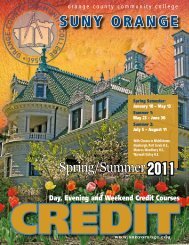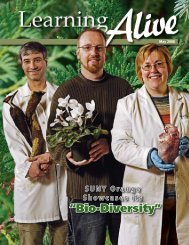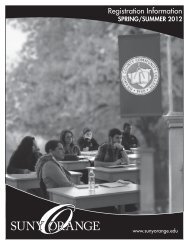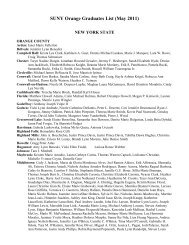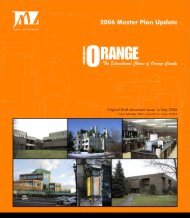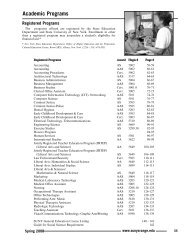You also want an ePaper? Increase the reach of your titles
YUMPU automatically turns print PDFs into web optimized ePapers that Google loves.
Academic Policies and Procedures<br />
Change of Program<br />
To move from one <strong>SUNY</strong> <strong>Orange</strong> degree program to<br />
another, a student must complete a change of<br />
curriculum form. The department chairperson for the<br />
new degree program must approve the change. In order<br />
for a change of curriculum to be processed for the<br />
current semester, the form must be receivied by Records<br />
and Registration by the end of the third week of the<br />
semester. Any change of curriculums received after the<br />
third week will be effective for the subsequent term.<br />
Forms are available from Records and Registration. If a<br />
student wishes to change advisors, the request should be<br />
submitted to the Advising and Counseling Center after<br />
the change of curriculum form has been filed.<br />
Academic Dishonesty<br />
Academic dishonesty is regarded by the College as an<br />
intolerable breach of academic ethics and will be treated<br />
as a serious offense. The consequences of academic<br />
dishonesty may include academic penalties, disciplinary<br />
action or legal action. (Refer also to “Student Rights &<br />
Responsibilities” section of this catalog.)<br />
Academic dishonesty, as defined in the Code of<br />
Student Conduct, includes, but is not limited to:<br />
cheating, including cybercheating; fabrication;<br />
facilitating academic dishonesty; plagiarism,<br />
including internet plagiarism; forgery; bribery; or<br />
multiple submission (submitting the same assignment<br />
to more than one instructor without the permission of<br />
the instructors).<br />
Conduct Expected of Students<br />
The College reserves the right to dismiss any<br />
student who exhibits conduct incompatible with the<br />
purposes of the College. The <strong>SUNY</strong> <strong>Orange</strong> Board of<br />
Trustees, administration, faculty and staff have a<br />
primary concern for the academic achievement,<br />
standards and personal integrity of our students;<br />
recognize their obligation to protect college property;<br />
and take a special interest in the mental and physical<br />
health of the college community.<br />
Committed to preserving the peace, uplifting<br />
campus morale and creating a civil climate on its<br />
campuses, <strong>SUNY</strong> <strong>Orange</strong> has adopted specific<br />
policies and procedures regarding student conduct.<br />
These policies and procedures, in the form of the<br />
Code of Student Conduct, are published in the<br />
Student Handbook.<br />
The Placement Test<br />
The Placement Test is mandatory and used to determine<br />
each student’s reading, writing and mathematical abilities.<br />
It must be taken after a student applies to the College but<br />
before that student may register for any classes.<br />
Its purpose is to insure that each student has the<br />
necessary skills in each of these critical areas to begin<br />
college-level study. If the student needs more work in<br />
any area, he or she will begin at the developmental<br />
course level.<br />
Developmental Course Placement<br />
For students who have tested into two or more<br />
developmental courses in reading, writing or<br />
mathematics, the College has created the following<br />
academic policies and procedures to insure their<br />
success:<br />
• Students who are placed on academic probation<br />
(less than 2.0 CumGPA) or receive an W, DVF, or<br />
DVH in a developmental course will receive a<br />
letter stating that the student’s records will be<br />
reviewed by the Developmental Education<br />
Review Board. This review board may then limit<br />
the number of credits that the student may take<br />
or stipulate specific course(s) that the student<br />
must take. Students will have the option of<br />
meeting with the Developmental Review Board to<br />
discuss their circumstances before decisions are<br />
made.<br />
• Students who receive grades of DVH or DVF in a<br />
particular developmental course will be allowed<br />
to repeat that developmental course only two<br />
additional times for a total of three attempts. If<br />
students do not successfully complete a particular<br />
developmental course by the third attempt, they<br />
will be separated from the college for one year.<br />
Upon their return to the college, students will be<br />
granted one attempt to successfully repeat the<br />
course(s). A grade of DVH or DVF would require<br />
another year separation. The appeals process will<br />
be available to those students who will be<br />
separated. The above applies to all students<br />
regardless of the number of developmental<br />
courses they are required to take.<br />
• Any student who fails to obtain the minimum<br />
credits passed that are indicated below will be<br />
separated from the college for a period of one year.<br />
Total Credits<br />
Minimum Credits<br />
Attempted<br />
Passed<br />
24 6<br />
36 12<br />
48 18<br />
Credits attempted excludes courses where a student<br />
has received a grade of W, I, M or N. Developmental<br />
students who wish to appeal the decision of the<br />
Developmental Education Review Board may appeal<br />
to the appropriate associate vice president.<br />
During the registration process, the academic<br />
advisor and the student create the student’s course<br />
36 www.sunyorange.edu<br />
Spring 2012


